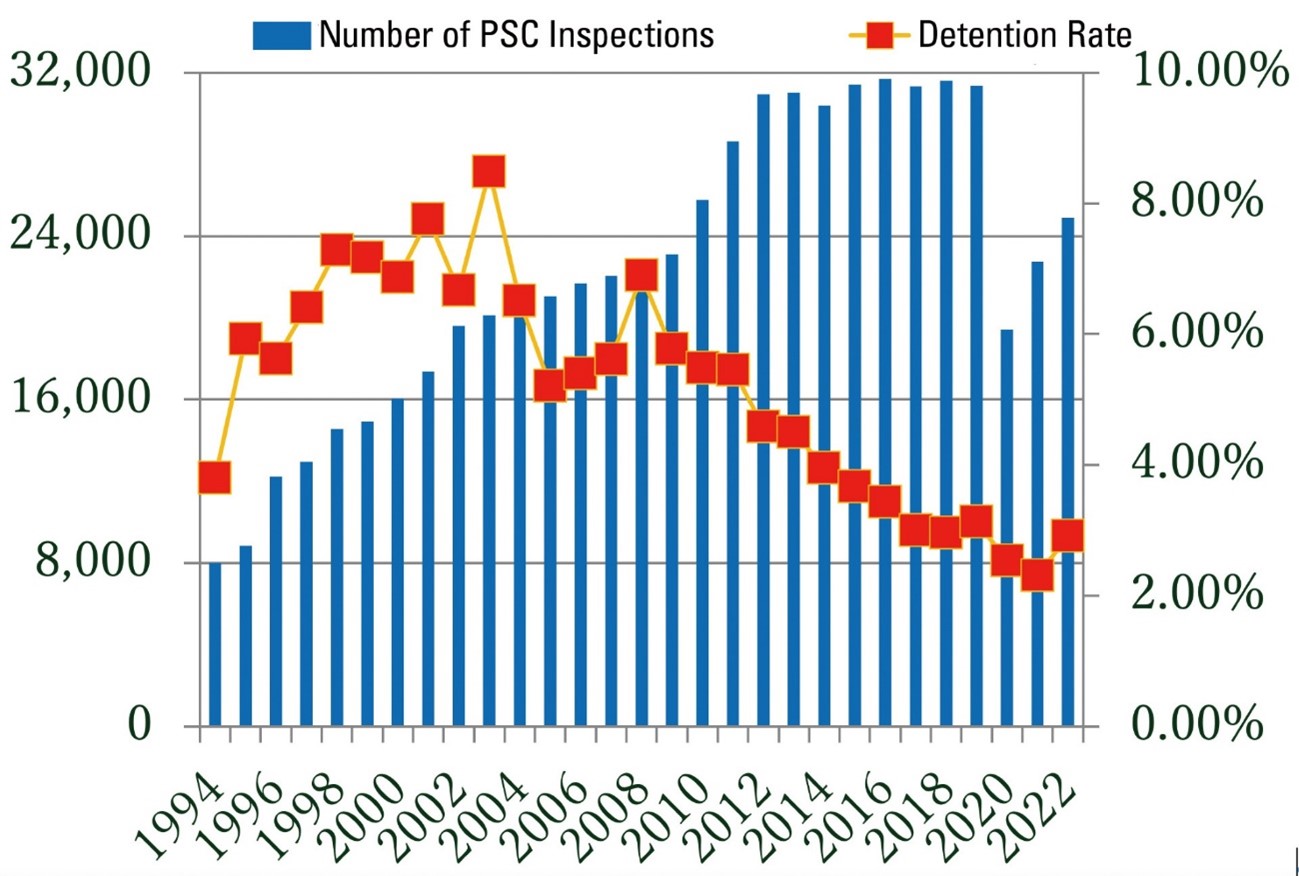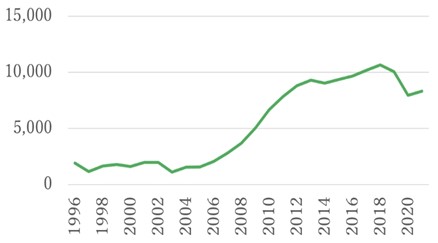Ocean Newsletter
No.560 December 5, 2023
-
On the 30th Anniversary of the Tokyo MOU and its Future Initiatives
KUBOTA Hideo (Secretary of the Tokyo MOU Secretariat)
This year marks the 30th anniversary of the "Memorandum of Understanding on Port State Control in the Asia-Pacific Region," adopted in Tokyo in December 1993. The Tokyo MOU refers to both this memorandum and an international regional organization for port State control (PSC) cooperation, which was established in accordance with this memorandum. This report covers the background to the Tokyo MOU’s establishment, its initiatives to date, and future efforts toward improving global maritime safety, marine environment protection, and living and working conditions for seafarers.
-
Various Issues Surrounding the Handling of Sunken Warships
AIZAWA Teruaki(Associate Professor, School of Defense Sciences, Department of Leadership and Military History, National Defense Academy (Retired Captain, JMSDF))
With the development of underwater exploration technology, famous sunken warships are being discovered one after another around the world, but the reality is that most of these discoveries are being made through the voluntary efforts of NPOs and other organizations. Considering the need for research and analysis, which is expected to increase further in the future, as well as the coordination regarding the organization and utilization of collected materials, the memorializing and honoring of the dead, and the response to various issues under international law, these efforts constitute a new challenge regarding the ocean and so require a shift to an organizational and cross-disciplinary response from the public and private sectors.
-
The Charm and Diverse Features of Sand Grains
TSUBAKI Remi(CEO of Eusapia Co., Ltd.)
When you look at sand grains under a microscope, the fascinating variety of shapes is more than you might imagine. Sand grains come from a variety of sources, including those created by biological activity and those created by molten rock from volcanic eruptions that have cooled and solidified. Currently, most of Japan's coastline is lined with reclaimed land and seawalls, and there are almost no sandy beaches left that maintain a healthy connection with the land. There are probably many species that have quietly become extinct on sandy beaches that are now no more than sparse remnants of their former selves. The duty to preserve for future generations the sandy beaches now in danger of dying rests with us.
On the 30th Anniversary of the Tokyo MOU and its Future Initiatives
This year marks the 30th anniversary of the "Memorandum of Understanding on Port State Control in the Asia-Pacific Region," adopted in Tokyo in December 1993. The Tokyo MOU refers to both this memorandum and an international regional organization for port State control (PSC) cooperation, which was established in accordance with this memorandum. This report covers the background to the Tokyo MOU’s establishment, its initiatives to date, and future efforts toward improving global maritime safety, marine environment protection, and living and working conditions for seafarers.
Globally Strengthening PSC and the Establishment of the Tokyo MOU
Notably, the grounding of the oil tanker Amoco Cadiz off the coast of Brittany, France in 1978 resulted in the spillage of 223,000 tons of oil, causing significant damage to France and other European coastal countries. Following this accident, the European Parliament began discussions on a systematic approach to on-site inspections of vessels by port States, i.e., port State control (PSC) . If countries implement PSC on their own way, it could lead to issues such as vessels undergoing multiple PSCs in the same region or unhealthy competition among neighboring ports due to the various stringency of inspections. Therefore, the European Parliament highlighted the need for regional international cooperation in implementing PSC. Based on these discussions, the first-ever regional PSC regime was created in Europe. The Paris MoU, which was established and began its activities in 1982, consisted of a PSC cooperation system among countries in Europe and the North Atlantic region. It has currently 27 member States.
The regional cooperation framework of the Paris MoU has achieved certain results in terms of effective implementation of the PSC. In response, the International Maritime Organization (IMO) adopted the resolution: "Regional Co-Operation in the Control of Ships and Discharges (A.682(17))" at its 17th session of the Assembly in 1991, urging countries to consider establishing the same kind of frameworks as the Paris MoU.
In the Asia-Pacific region, Japan took the lead in preparing for a regional PSC regime, convening a preparatory meeting in 1992. At the fourth meeting in December 1993, the Tokyo MOU ("Memorandum of Understanding on Port State Control in the Asia-Pacific Region") was adopted with the signatures of 18 countries and regions.
Performance and Impact of PSC Inspections
This year, the Tokyo MOU celebrated its 30th anniversary since its adoption in December 1993, with the number of official members reaching 23 as of the end of October 20231. Over the past 30 years, PSC within the Tokyo MOU region has produced solid results. Recently, the number of PSC inspections in the region has exceeded 30,000 per year, and the inspection rate for vessels that have called in ports in the region is about 70%. This rate is not 100% partly because, in the regional PSC, once a vessel is determined to have good performance, PSC is not conducted in neighboring ports for a certain period of time.
One indicator of PSC effectiveness is the detention rate, which measures the proportion of vessels detained until deficiencies are rectified. During the first decade after the establishment of the Tokyo MOU, the detention rate gradually increased to a high level of 6-8%, but it has since decreased, currently hovering around 2-3%. This decrease in detention rate indicates that the Tokyo MOU is functioning effectively as a framework for regional cooperation in PSC (refer to Figures 1 and 2).
Moreover, since 2011, vessels detained three or more times in a year are listed as "Under-Performing Ships" on the Tokyo MOU website, with details such as the ship's name published. Ships categorized as under-performing undergo stricter measures, such as PSC inspections at every port call. When the system began in 2011, there were 91 of these ships, but numbers have now decreased to less than one-tenth of that, to only 8 in 2022.
The frequency of maritime accidents in the Asia-Pacific region has also been reduced to about one-eighth of what was at the time of the Tokyo MOU's establishment. These results suggest that PSC has significantly contributed to this decrease in maritime accidents. The Tokyo MOU has been conducting PSC inspections primarily on merchant ships, but it has decided to expand these inspections to fishing vessels, which are considered to be at higher risk. Preparations for implementing this expansion are currently underway.

■Figure 1: Trends in the Number of PSC Inspections and Ship Detention Rates in the Tokyo MOU Region

■ Figure 2: Trends in Inspections of Ships by Developing Members of the Tokyo MOU
Achieving Maritime Safety through Regional Cooperation
Since its establishment, the Tokyo MOU has actively engaged in enhancing the capabilities of Port State Control Officers (PSCOs) within the region and harmonizing inspection procedures, through significant support from The Nippon Foundation. Every five years, it formulates a five-year Integrated Strategic Plan for Technical Co-operation Programmes and works towards its implementation. Specifically, this includes General Training Course to impart essential knowledge to PSCOs (one week of lectures and two weeks of practical training on board ships. In addition, pre-learning using a distance learning programme system with 32 subjects is conducted in advance), Specialized Training Course for acquiring expertise on specific themes, Expert Mission for dispatching experienced PSCOs to member authorities for classroom learning and on-site ship visit training, and PSCO Exchange Programs where PSCOs participate in inspections of other member authorities to discuss differences with the aim of harmonizing inspection procedures.
Over the past 30 years, the cumulative number of participants in the Tokyo MOU's technical co-operation programmes has exceeded 4,500. This has led to an increase in inspection performance by developing member Authorities. In addition, since the primary responsibility for compliance with the provisions of international conventions by vessels navigating within the region lies with the flag states, the Tokyo MOU, with the support of The Nippon Foundation, held the Seminar for Flag Performance Improvement in 2019 and 2022, inviting policymakers and others from flag States in the region2. Through these initiatives, it is expected that awareness has been raised among flag states towards improving their performance and enhancing the quality of vessels.
Currently, there are nine regional PSC regimes3 around the world, including the Tokyo MOU. Cooperation among these regional organizations is crucial to ensure effective implementation of PSC on vessels navigating worldwide. The Tokyo MOU actively exchanges information and opinions with all other regional organizations by recognizing each other as observers.
We intend to continue our efforts towards more effective and efficient implementation of PSC, contributing to improve global maritime safety, marine environment protection, and living and working conditions for seafarers. (End)
Member Authorities include Australia, Canada, Chile, China, Fiji, Hong Kong, Indonesia, Japan, Republic of Korea, Malaysia, the Marshall Islands, Mexico, New Zealand, Panama, Papua New Guinea, Peru, Philippines, Russian Federation, Singapore, Thailand, Vanuatu, and Viet Nam.
2 Participants in 2019 included the Cook Islands, Fiji, Indonesia, Niue, and Papua New Guinea, while in 2022, Cambodia, Kiribati, Mongolia, and Palau participated.
3 The regional regimes other than the Tokyo MOU are the Paris MoU, Indian Ocean MOU, Black Sea MOU, Riyadh MOU, Caribbean MOU, Abuja MOU, Mediterranean MOU, and the Viña del Mar Agreement (South American MOU).
